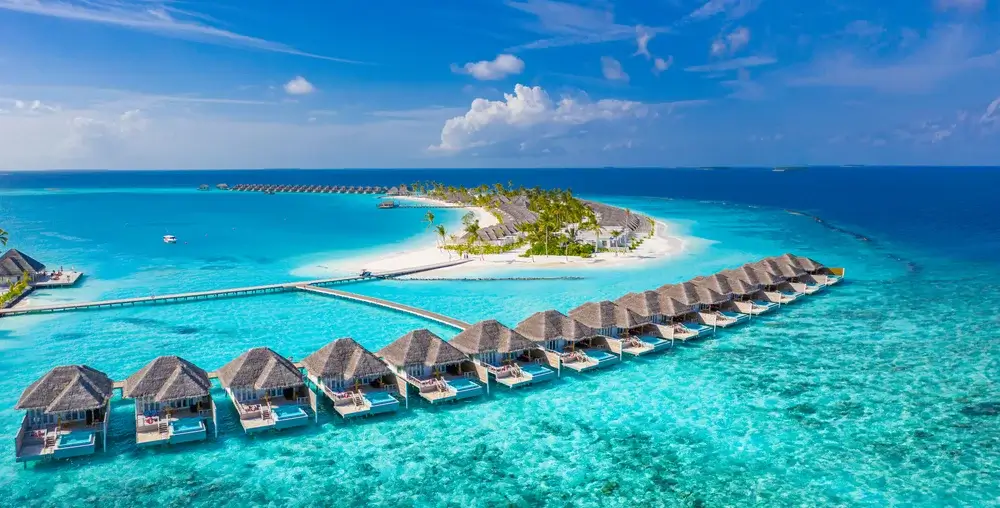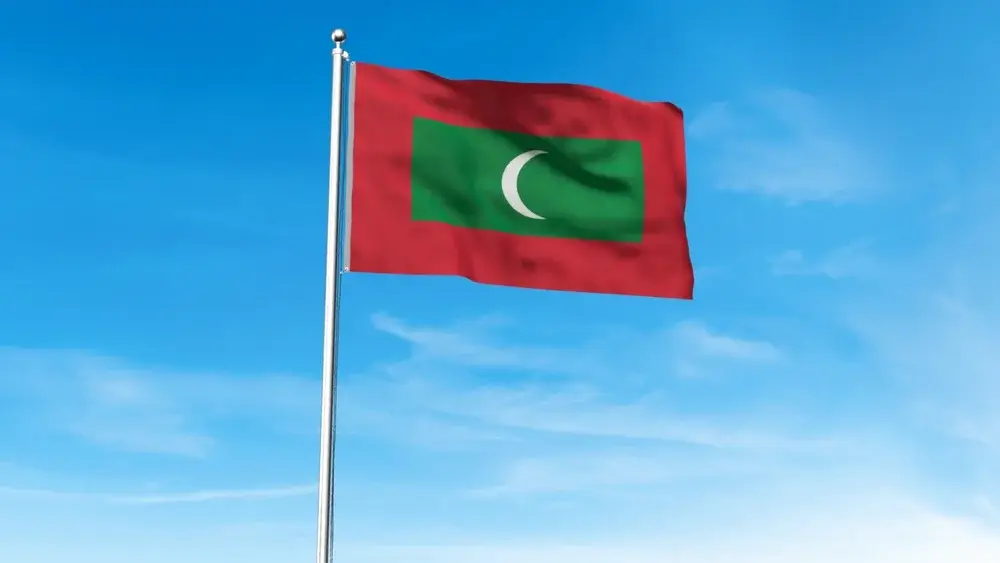Maldives
Maldives Country Guide

With 1,190 Islands, Maldives is an island nation in the Indian Sea located to the southwest of India as well as Sri Lanka. With white sandy beaches, turquoise waters, bountiful marine life, and also unique bungalows perched over the sea. Maldives is considered one of the leading beach locations on the planet and among the high-end honeymoon destinations in Asia. Sadly, Maldives has actually constantly been among those luxury tropical destinations. Still, Maldives attracts countless visitors from around the world as it is populated with many beaches.
Things To Know Before Going To Maldives
- Bring lots of sunscreen as the Maldives is a tropical paradise with abundant sunshine.
- Keep your passport with you at all times due to strict immigration laws.
- Mosquitoes are present, but mosquito repellent and regular fogging by resorts ensure safety, with no disease risk.
- LGBTQ issues may arise on islands, but resorts are open-minded and do not differentiate guests based on orientation.
- Bikinis are not allowed in public on islands, but are permitted in resorts; smart casual attire is recommended otherwise.
- To enter the Maldives, fill out the Health Declaration Form (Imuga) 48 hours before departure.
- As the Maldives is an Islamic country, dress modestly in public; women should avoid shorts or tank tops.
- Small resorts can become boring after 5-7 days; consider alternating between boat and seaplane transfers for efficiency.
- Buffets can get monotonous, so if possible, opt for restaurant dining with gold wristbands; large resorts offer more facilities and activities.
- Overwater bungalows are more expensive and smaller, while land cabins are more spacious and near the beach.
- Respect local culture and customs, and dress modestly in public areas.
- Be respectful of the marine environment.
- Prepare for heat and humidity, and stay hydrated.
- Plan your trip according to the monsoon seasons.
- Many islands are uninhabited, requiring boat or seaplane transfers.
- The Maldives is a luxury destination with a high cost of living.
- Transport costs are high; local ferries or shared speedboats can save money but check schedules and availability.
- Ferries do not operate on Fridays except to Hulhumale; speedboats cost $25-$35, and seaplanes $200-$500 per trip.
Cultural and Local Maldives Tips
- Cover shoulders and knees with proper clothing while in Male and Hulhumale; usual clothes are fine on tourist islands, but check with your hotel about bikini policies.
- Book a room facing east if you're an early riser to watch the sunrise.
- Avoid touching marine life to prevent injuries, as you might get stung by creatures like jellyfish.
- Traveling by seaplane is worth the extra cost for the experience.
- The Maldives primarily offers water sports and waves; staying too long might lead to boredom.
- Bring your own snorkeling equipment to avoid using shared gear.
- Extra conditioner is essential for managing hair affected by saltwater.
- Avoid touching wild or stray animals due to the risk of rabies.
- Wear a sarong, scarf, and udeng when entering a temple; women should avoid temples during their period.
- Do not sit on offerings or statues.
- Avoid renting or riding motorbikes if inexperienced, as traffic can be dangerous; opt for online taxi services instead.
- Use water or ice from gallon bottles, not tap water; ask before buying drinks or food.
- "Bali Belly" can be caused by spicy food; avoid overly spicy dishes if sensitive.
- Shop at stores with fixed prices if you don't know how to bargain.
- Respect local beliefs in karma; locals will treat you like family if you are kind.
- For Muslims, check food ingredients to ensure they do not contain pork.
- Avoid public displays of affection.
- Importing alcohol to the Maldives is prohibited.
- Avoid drinking tap water.
- Do not attempt to smuggle banned items.
- Do not wear shoes on the beach.
- Seaplane flights may not be on time.
- Selling or purchasing black corals or turtle shells is prohibited.
Is Maldives Expensive To Visit?
Yes, Maldives is an expensive country to visit as the beauty of country is unique to itself. However, staying on a locally inhabited island is an excellent way to experience the Maldives on a budget, with around 200 populated islands offering more affordable guesthouses as an alternative to the costly private resorts. Maafushi, the first island to introduce guesthouses, is a prime destination for budget travelers. Booking a guesthouse or resort on a local island allows tourists to experience Maldivian culture, and local cuisine, and access regional ferries and public transport. Popular islands like Thulusdhoo, Maafushi, Dhiffushi, Huraa, Himmafushi, and Hulhumale offer the most affordable accommodation options and exciting water sports such as parasailing, jet skiing, and diving.
Is Visiting Maldives Worth It?
Maldives offers unmatched luxury, privacy, and unique experiences. The service is exceptional, and the food is world-class. On the cons side, the Maldives can be expensive. Everything from meals to activities can cost more than they would elsewhere. If you are ready to break the bank in general, Maldives is your must-go country!
Is Maldives Good For Honeymoon?
Maldives is well known as one of the best destinations for honeymoons. Also, did you know that in Maldives, some resorts will give special privileges to couples who are on honeymoon?
Is Maldives Safe For Tourists?
In general, Maldives are safe in resort areas. Outside the resorts, there are incidents of gang-related violence including knife crime, mainly in Malé and in Hulhumalé. Avoid empty roads when on foot, particularly after dark. Crime levels are low in the exclusive resort islands, but petty crime does happen. Do not leave items unattended on the beach or in unlocked hotel rooms. Also, Maldives is an Islamic country. It is illegal to publicly observe a religion other than Islam. Make sure that your actions do not offend, especially during Ramadan or when visiting religious areas around mosques. Alcoholic drinks are only available on resort islands. Do not take any alcohol out of your resort. You can be arrested and deported for possessing and drinking alcohol, or being intoxicated outside resorts and on inhabited islands.
Are Maldives People Friendly?
Maldivians are known for their warm hospitality and friendly towards tourists. Visitors often find themselves welcomed with open arms and genuine smiles upon arrival. Locals love showing the beauty of their country and are eager to share their culture, traditions, and way of life with visitors. For Maldivians, interacting with tourists offers a chance for cultural exchange and learning. Long in short, tourists visiting the Maldives can expect a warm welcome from the locals, who view them not only as guests but also as partners in promoting sustainable tourism and preserving the natural beauty of their islands.
Where To Go in the Maldives?
Here’s your fast Maldives city guide depending on where area you are planning to visit:
City Name | Best For | Best Attractions |
| Huvafen Fushi | Luxury | Underwater spa Private beach with individual pools High-end experience |
| Baros | Diving | Excellent diving sites House reef accessible from the beach |
| Velassaru | Dining | Various restaurants offering Japanese, Italian, and Maldivian cuisines |
| Kurumba | Families | Wide range of family-friendly activities Kids' club Water sports |
| Dhigali | Nature Lovers | Pristine natural environment Lush vegetation Beautiful beach Snorkeling spots |
| Milaidhoo | Couples | Intimate resort Romantic atmosphere Overwater villas Spa |
Sip your cocktail by the ocean and enjoy the sun setting under your feet at hotels in Maldives!
Must-See Maldives Attractions
- Male: The capital city of Maldives, known for its colorful buildings, historic landmarks, and markets.
- Hulhumale Island: A man-made island located near Male, known for its beaches, water sports activities, and beautiful sunsets.
- Maafushi Island: A popular budget-friendly destination with white sand beaches, clear waters, and coral reefs.
- Ari Atoll: A group of islands located in the western part of the Maldives, known for its luxury resorts, water sports activities, and diving spots.
- Addu Atoll: The southernmost atoll in the Maldives, known for its diverse marine life, historic landmarks, and unique culture.
- Baa Atoll: A UNESCO Biosphere Reserve known for its rich marine life, vibrant coral reefs, and luxury resorts.
- Vaavu Atoll: A group of islands known for its stunning dive sites, including the famous “Fotteyo Kandu” dive spot.
- North Male Atoll: A popular destination for luxury resorts, water sports activities, and stunning beaches.
- South Male Atoll: A destination known for its pristine beaches, turquoise waters, and coral reefs.
- Fuvahmulah: A unique island located in the southern part of Maldives, known for its diverse wildlife, including the rare and endemic Fuvahmulah crow and the giant hermit crab.
When Is The Best Time To Visit the Maldives?
November through April marks the optimal period to visit the Maldives due to its coastal location. Conversely, May to October, considered the low season, caters well to budget-conscious travelers with reduced prices. This period coincides with the onset of the monsoon and fewer sunny days, prompting resorts and airlines to offer substantial discounts of up to 40%. Moreover, traveling during the off-season means encountering fewer crowds at beaches and attractions, enhancing the overall experience.
Where is the Maldives?
The Maldives is an island country located in the Indian Ocean, southwest of Sri Lanka and India. It is situated north of the equator and is connected to the Asian continent, with a distance of approximately 600 km from India and 750 km from Sri Lanka. The Maldives is an archipelago consisting of about 1,200 coral islands, with the majority being uninhabited. The country is spread over an area of 90,000 square kilometers, with a land area of 298 square kilometers
What is the Capital of Maldives?
The capital of the Maldives is Malé. Malé is located in the Kaafu Atoll and is the most populated city in the country. It is traditionally known as the "King's Island" where ancient royal dynasties ruled from its central location.
Languages Spoken in Maldives
Dhivehi (or Divehi): The official language of the Maldives, spoken by about 340,000 people. Dhivehi is an Indo-Aryan language that has been influenced by Arabic, English, Hindi, Sinhalese, and Urdu. It is written in the Thaana script, which evolved from the Arabic script.
English: While not an official language, English is widely spoken in the Maldives, especially in the tourism industry and among the educated population.
Other languages: Due to the growing tourism industry, German, Italian, Spanish, Arabic, and Japanese are also spoken in the Maldives, particularly in resorts and tourist areas.
Time Zone of Maldives
The Maldives has one official time zone called Maldives Time (MVT), which is 5 hours ahead of Coordinated Universal Time (UTC+05:00).
What Currency Does Maldives Use?
The currency used in the Maldives is the Maldivian Rufiyaa, which is denoted by the symbol "MVR".
Maldives Flag

The flag of the Maldives consists of a green rectangle centered on a red field, with a white crescent facing the fly side in the center. The colors and symbols of the Maldives flag have the following meanings:
- Red: Represents the blood shed by the nation's heroes and their willingness to sacrifice for their country.
- Green: Symbolizes peace, prosperity, and the lush vegetation of the islands.
- White crescent: Represents the Islamic faith of the state and authorities
Population of Maldives
The current population of Maldives is 518,231 as of 2024. Most of the population lives in the capital city, Malé.

